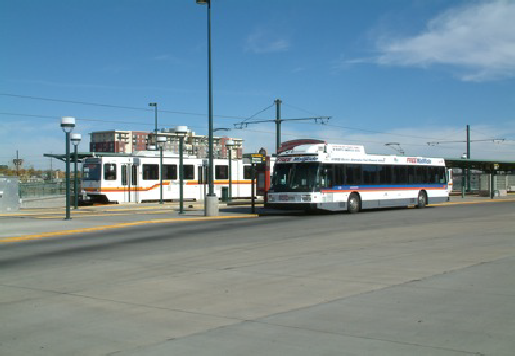No Light Rail in Vancouver!
It would be nice to think that Denver Regional Transit District (RTD) General Manager
Cal Marsella is feeling pangs of guilt for lying to the public so often about the
virtues of rail transit. That would explain why, even though he is one of the highest-

One reason why transit officials like trains is that the top officials of rail transit agencies get paid more than the leaders of agencies that only run buses.
In 1995, RTD paid Marsella $112,000 to run RTD, which was then mostly a bus system.
He was picked for the job partly because he and the then-
Within a few years, he had changed his tune, overseeing construction of two new light-
“RTD always builds its rail lines on budget,” he told people. (In fact, it went nearly
30 percent over its original projected cost on its Southwest light-
“Our studies found that rail transit is the most cost-
“Rail transit reduces air pollution,” he insisted. (Since Denver’s light-
One person who greatly benefitted from these lies was Cal Marsella. By 2008, RTD’s board had nearly tripled Marsella’s pay to $324,000. For 2009, when many other RTD employees were accepting pay cuts, Marsella magnanimously agreed to accept a 3 percent cut from his schedule pay increase.
Now Denver’s rail dreams have turned to nightmares. The latest projections are that the six new rail lines will cost about 50 percent more than promised in 2004, while the tax revenues needed to pay for them are falling billions of dollars short (and that’s based on the optimistic projection that 2009 revenues will be just 3 percent less than in 2008, even though the revenues for the first couple of months of the year were down 14 percent). RTD doesn’t have enough money to run the trains and buses it has, and is cutting service on many of its routes.
At age 58, it’s a little early for Marsella to retire. Given his poor record as a manager, it is hard for him to persuasively argue that he is being hired away because of his great talents. So is he leaving out of remorse that he persuaded Denver to support such a folly? Is he a rat jumping the sinking ship?
Or is he, like the bureaucrats who run Japan, “descending from heaven” to earn a few more million before he retires as a reward for funneling so much taxpayer money to transit contractors? Whatever the answer, it is hardly a testimonial to the integrity of America’s transit industry.